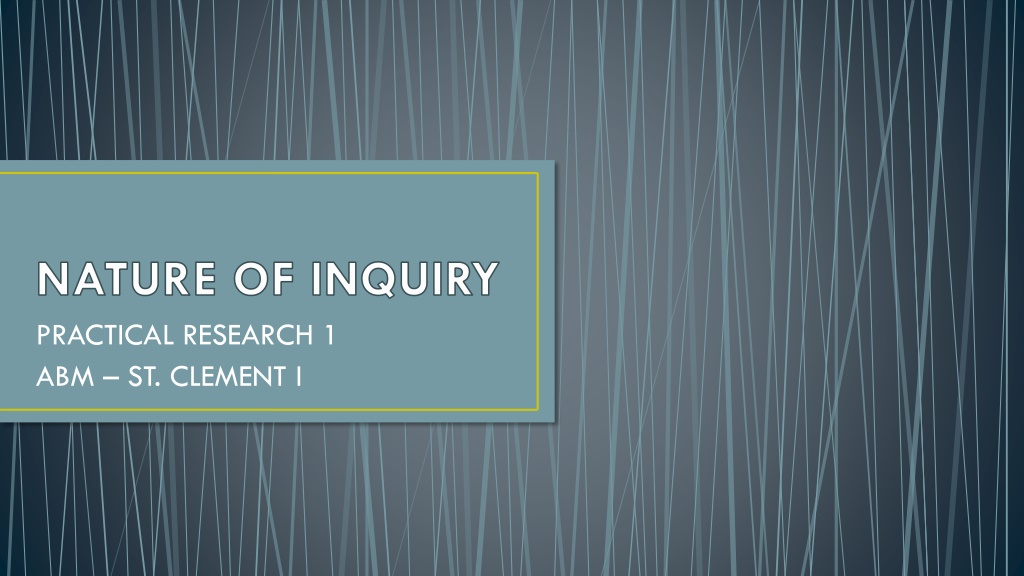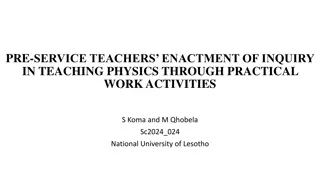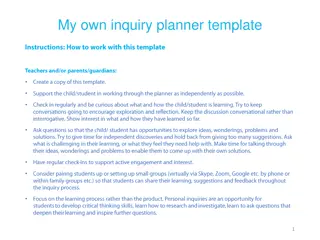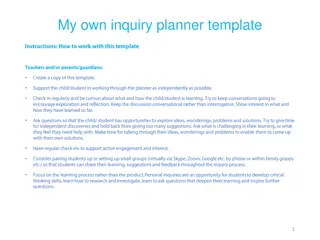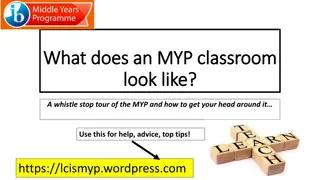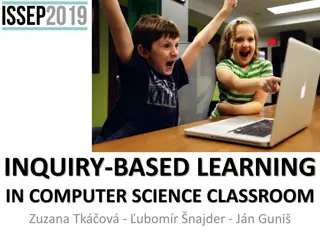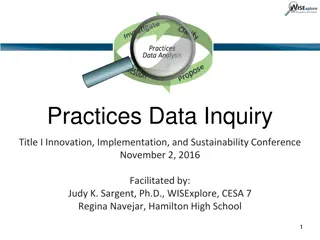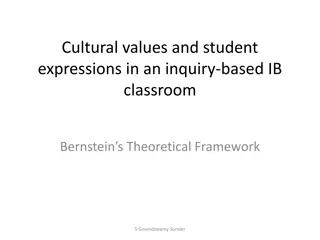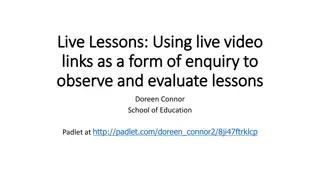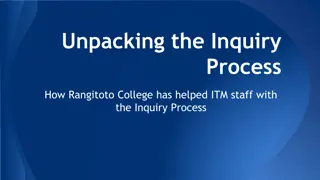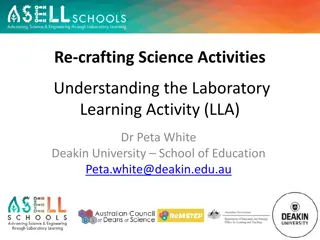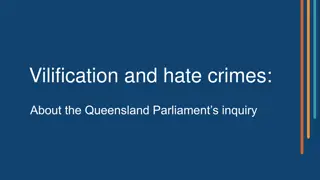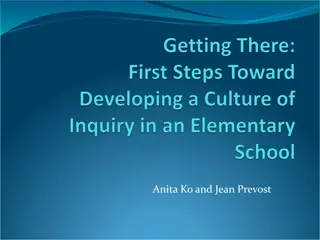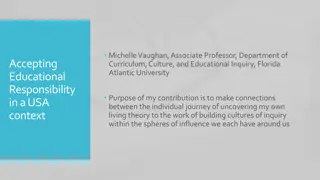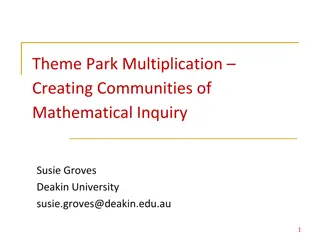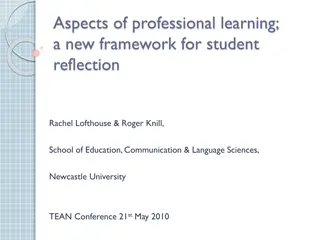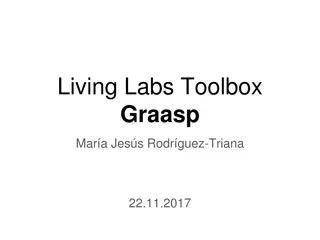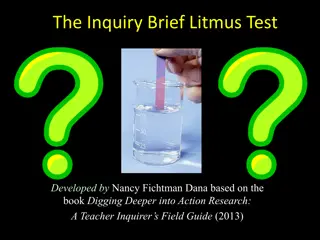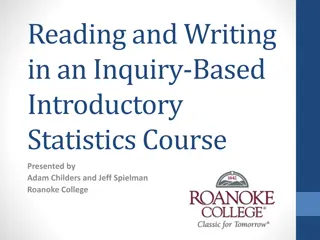Understanding Inquiry-Based Learning in Educational Practice
Inquiry-based learning is a dynamic educational approach that fosters curiosity and critical thinking skills. It encourages students to explore, question, and create new knowledge collaboratively. This method transforms traditional learning into an interactive, engaging process that cultivates innovative thinking for personal and global growth.
Download Presentation

Please find below an Image/Link to download the presentation.
The content on the website is provided AS IS for your information and personal use only. It may not be sold, licensed, or shared on other websites without obtaining consent from the author. Download presentation by click this link. If you encounter any issues during the download, it is possible that the publisher has removed the file from their server.
E N D
Presentation Transcript
NATURE OF INQUIRY PRACTICAL RESEARCH 1 ABM ST. CLEMENT I
INQUIRE The detectives need more time to INQUIRE about the case.
CRUCIAL The witness s statement is CRUCIAL to the solution of the case.
GUARANTEE The continuous presence of your name on the dean s list GUARANTEES a good future for you.
Selection Title: INQUIRY-BASED LEARNING What comes to your mind upon reading the selection s title, Inquiry-based Learning? Make inferences about this selection.
INQUIRY-BASED LEARNING Meaning of Inquiry Inquiry is a learning process that motivates you to obtain knowledge or information about people, things, places, or events. You do this by investigating or asking questions about something you are inquisitive about, and examining such data carefully.
Inquiry elevates your thinking power. It makes you think in different ways, enabling you to arrive at a particular idea or understanding that will motivate you to create something unique, new, or innovative for your personal growth as well as for the world.
Inquiry, as a problem-solving technique, includes cooperative learning because any knowledge from members of the society can help to make the solution. Whatever knowledge you have about your world bears the influence of your cultural, sociological, institutional, or ideological understanding of the world (Badke, 2012).
GOVERNING PRINCIPLES OR FOUNDATIONS OF INQUIRY 3 Educational Theories as foundation of Inquiry-based Learning 1. JOHN DEWEY s theory of connected experiences for exploratory and reflective thinking. 2. LEV VYGOTSKY s Zone of Proximal Development (ZPD) that stresses the essence of provocation and scaffolding in learning. 3. JEROME BRUNER s theory on learner s varied world perceptions for their own interpretations.
Benefits of Inquiry-based Learning In conclusion, you can say that Inquiry-based Learning gives you the following advantages: 1. Elevates interpretative thinking through graphic skills 2. Improves student learning abilities 3. Widens learners s vocabulary 4. Facilitates problem-solving acts 5. Increases social awareness and cultural knowledge 6. Encourages cooperative learning 7. Provides mastery of procedural knowledge 8. Encourages higher-order thinking strategies 9. Hastens conceptual understanding
Take-home Activity 1: Some of the following questions will require more complex thinking while some demand simple or less thinking. Put a check on the questions that requires more complex thinking and put an ex to those that trigger simple and less thinking. 1. What s the color of your gown? ____ 2. Who bought your gown? ____ 3. Why are some graduating students not willing to wear gowns? ____
4. Which memo are you talking about? ____ 5. Do you agree that Mr. Cruz was the one who wrote the memo? ____ 6. Which article seems intriguing to the graduates? ____ 7. What is inside the pocket of the green gown? ____ 8. Who owns the gown? ____ 9. How can the gown make you look more attractive? ____ 10.Should you wear a gown during the graduation ball? ____
Take-home Activity 2: In one whole sheet of paper, present your understanding of inquiry through a topical outline. Limit your answer in 300 words.
Take-home Activity 3: Do the activity below and write your answer in your notebook. SPECULATIONS: Recall the hottest issue in town. Prove how inquisitive you are by raising top-level probing questions about it.
GOODLUCK! Don t forget to log-in for your attendance. Thanks!
